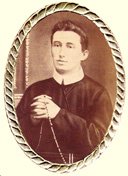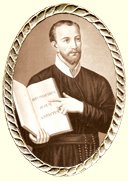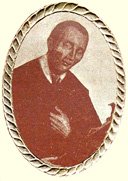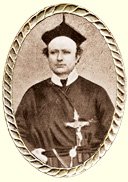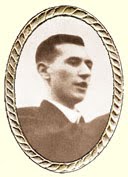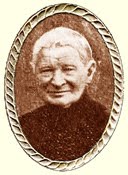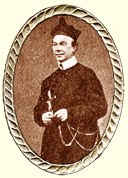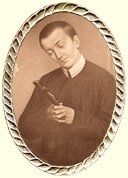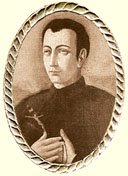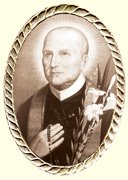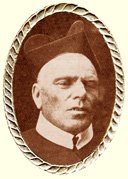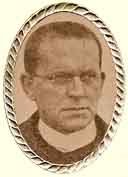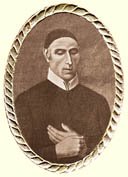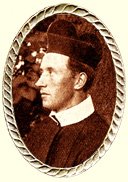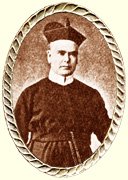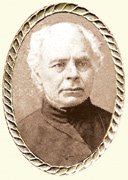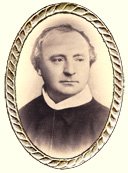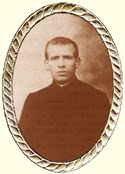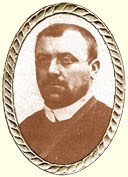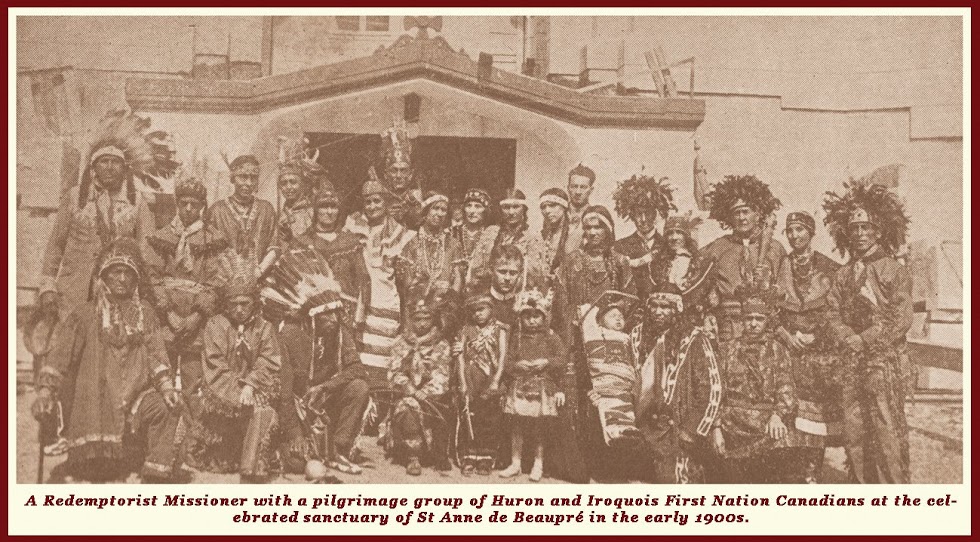Dès le premier jour de leur arrivée dans la Ville éternelle, les deux amis se mirent à en parcourir les rues, cherchant la demeure de quelque étudiant hollandais, qui pût les aider à se faire admettre au Collège Romain. Ils surent bientôt qu'ils devaient se rendre auprès du cardinal Capellari (plus tard Grégoire XVI), ou bien chez Mgr Caprano, secrétaire de la Propagande. Leur résolution fut bientôt prise; dès le lendemain ils se présentèrent à l'hôtel du cardinal, munis d'une foule de lettres de recommandation. Son Eminence les accueillit avec bonté et leur dit de se rendre, le jour suivant, chez Mgr Caprano.
Toujours plein de sollicitude pour ses enfants persécutés, le Souverain Pontife avait pris grandement à coeur les intérêts des séminaristes exilés de la Hollande. Mgr Caprano, après avoir reçu nos deux jeunes gens de la manière la plus affable, leur manifesta le désir de Sa Sainteté, Léon XII, que les séminaristes hollandais qui venaient à Rome, poursuivîssent leurs études au Collège Romain; que s'ils n'avaient pas assez de fortune pour se procurer à leurs frais le vivre et le logement, la Propagande leur viendrait en aide et pourvoirait à leurs besoins.
Par une attention délicate, un prêtre, le P. Lacroix, était expressément chargé par le Souverain Pontife de prendre en mains les intérêts des étudiants hollandais. Ce bon prêtre se mit incontinent à la recherche d'une demeure convenable pour ses nouveaux clients, et ce jour-là même Hafkenscheid et Beelen, après s'être fait inscrire comme théologiens au Collège Romain, purent fixer leur tente : Via dell' Angelo custode [1].

Les deux amis prirent, sans tarder, leurs mesures pour atteindre le but qui les avait amenés à Rome. Conduite régulière, peu de rapports avec le monde, fuite des divertissements, zèle persévérant pour l'étude, telles sont les règles qu'ils se prescrivirent, et auxquelles ils se conformèrent ponctuellement durant tout leur séjour dans la Ville éternelle. Il n'y avait encore que peu de temps qu'ils étaient à Rome, lorsque Bernard fit connaître à ses parents son ordre du jour : "Le matin, disait-il, je me lève vers sept heures ... Vers huit heures, nous allons au Collège, qui est éloigné de dix à douze minutes de notre demeure. Cependant, avant d'aller en classe, nous déjeûnons ... La classe dure deux heures et demie et se fait par deux professeurs différents ... L'un est un homme d'environ trente-cinq ans, qui enseigne déjà depuis quatorze ans. Le feu de la jeunesse n'est pas encore éteint en lui. Il joint à des connaissances extraordinaires le talent de les communiquer aux autres. c'est un homme, en un mot, dont je regretterais de devoir perdre une seule leçon. Les études au Collège Romain sont des plus fortes. Je ne doute nullement que je ne passe avec beaucoup de fruit les quelques années que j'espère séjourner à Rome.
"Le Collège Romain est compté à bon droit parmi les plus grands édifices de la cité. On y instruit la jeunesse depuis l'ABC jusqu'à la théologie. On commence par le latin et l'on finit par la théologie, de manière que le nombre des étudiants, grands et petits, qui se rencontrent tous les jours, à la même heure, quoique dans des salles diverses, s'élève à peu près à deux mille. Oui vraiment, nous sommes fiers d'appartenir à un tel collège.
"Les classes finies, nous assistons à la sainte messe dans l'église attentante au Collège. Oh ! le beau spectacle que ces deux mille jeunes gens agenouillés avec ordre dans l'enceinte de l'église ! Après la sainte messe, les Hollandais s'attendent les uns les autres devant la porte du Collège. Quel bonheur alors de se voir et de s'entretenir quelques moments ! Ensuite chacun se retire en sa demeure et étudie dans sa chambre, jusqu'à ce que la cloche sonne onze heures et demie, heure habituelle du diner ...
"A deux heures après-midi les classes recommencent. Comme le matin, elles durent deux heures et demie. Vers cinq heures, chacun se retire de nouveau dans sa chambre et passe la soirée avec ses livres ...
"Voilà mon genre de vie ordinaire. Maman avait coutume de dire que nous étions des promeneurs ou des voyageurs d'Emmaüs, je voudrais qu'elle nous vît un peu à Rome. Ici nous sommes ensemble nuit et jour; nous mangeons, nous buvons, nous nous promenons, nous étudions ensemble; en un mot, voit-on Beelen ? on voit Hafkenscheid; voit-on Hafkenscheid ? on voit Beelen."
Une amitié si intime entre deux jeunes gens pleins de talents devait nécessairement favoriser d'une manière notable leurs progrès dans les sciences. Ils travaillaient avec une ardeur qui ne se ralentissait point. Des occupations incessantes, écrivait Bernard à ses parents, m'ont empêché presque des mois entiers de songer à la maison paternelle ou à des affaires de famille ... Que s'il se répandait le bruit de quelque nouvelle, je ne le saurais même pas; car durant ces derniers mois, j'ai gardé la chambre, comme un ermite, depuis le matin jusqu'au soir." - Souvent même leurs heures de repos étaient employées à agrandir le cercle de leurs connaissances. Une chambre attentante à la leur était occupée par un avocat français, qu'ils ont dépeint comme "un homme de grand mérite, très honnête et très religieux.” Après avoir consacré, le soir, un temps considérable à l'étude, ils avaient coutume d'aller passer quelques moments avec leur voisin. L'entretien roulait alors sur les ouvrages de Lammenais, de de Bonald et autres; de sorte que cette récréation quotidienne leur était de la plus grande utilité. Par l'entremise de cet avocat, ils firent la connaissance du savant dominicain, de la Marche, et du célèbre théatin, Ventura; ils eurent même plus d'une conversation avec eux. Les relations avec de tels hommes durent nécessairement exercer une influence des plus salutaires sur l'esprit et sur le coeur de nos deux étudiants.
Bernard évitait toute espèce de société, afin de mieux jouir de la compagnie de ses livres. Ses parents lui ayant posé la question suivante : "Quels sont ceux que vous fréquentez ? " Il leur répondit : "Vous désirez que je vous fasse connaître ceux que je fréquente ? Eh bien, permettez-moi de vous dire leurs noms. Un des principaux personnages avec qui j'ai lié amitié, c'est saint Thomas, surtout dans sa "Somme théologique". Du matin au soir, il est en ma chambre, et même sur ma table ! Ce saint Auteur n'est pas facile à comprendre. Cependant à force de temps, je me suis tellement habitué à sa manière de parler, que je m'entretiens bien souvent avec lui jusqu'à minuit. Vous ne sauriez croire combien sa conversation m'est agréable. Jamais je ne le quitte sans avoir appris de lui quelque chose de nouveau. Les jours libres, c'est-à-dire le jeudi et le samedi, il m'arrive de passer plusieurs heures avec Lamennais, qui m'est d'un grand secours dans mes études théologiques, mais surtout philosophiques. (Alors la gloire de Lammenais n'était pas encore ternie par son orgueilleuse révolte contre l'Eglise).

"Vous comprenez bien que je ne m'occupe pas toujours de ces études si sérieures : l'arc ne saurait être toujours tendu. C'est pourquoi je rends de temps en temps une visite au poète italien le Tasse; d'ordinaire nous nous entretenons alors de la "Jérusalem délivrée" par Godefroid de Bouillon. Ce n'est ni de la philosophie, ni de la théologie; mais c'est si supérieurement beau et utile, que souvent je dois me plaindre de ne pouvoir goûter plus longtemps le plaisir d'une telle conversation ... Je fréquente Téa, qui a publié une belle "Description de Rome". Pendant les dernières vacances je lui ai souvent donné le bras, et j'ai vu et admiré sous sa conduite la vieille Rome avec ses monuments.
Que vous en semble ? Ne sont-ce pas là de belles et bonnes compagnies ? Je suis sûr qu'on ne pourrait former à Rome de meilleures liaisons. Aucune liaison avec quelque romain que ce soit, ne saurait être mise en parallèle avec les miennes. Je pourrais facilement, si je le voulais, être chaque soir dans telle ou telle société; mais je n'y tiens nullement. Je cherche des compagnies qui puissent m'être utiles pour l'esprit et pour le coeur.
"Peut-être fréquenté-je quelques savants ? - Ah ! oui; il y en a cinq ou six, qui me témoignent une grande affection. Ce sont mes professeurs, avec qui je puis converser aussi souvent et aussi longtemps que je le désire. Eux exceptés, je ne connais presque personne ... mais aussi je n'ai, à proprement parler, besoin de personne. Mes professeurs, mes livres, mes compagnons d'étude, hollandais et romains, sont pour moi la société la plus agréable que je puisse et doive fréquenter. Déjà depuis deux ans je converse avec eux, et je continuerai à m'attacher à eux tout le temps qu'il me reste à passer ici. Personne, hormis eux, ne saurait me procurer des médailles et des grades. (Comme nous le verrons bientôt, au moment où il écrivait ces lignes, son application à l'étude avait déjà été couronnée). Un travail non interrompu, voilà le seul moyen d'avancer et de faire des progrès qui méritent récompense. C'est à Rome que je suis devenu un peu philosophe, comme on dit vulgairement, et j'espère le devenir encore davantage ... C'st pourquoi nous sommes presque toujours dans nos chambres, étudiant de toutes nos forces, sans nous soucier beaucoup de ce qui se passe à Rome ou ailleurs. En vivant de la sorte, je crois vivre comme il faut, et acquérir l'esprit de l'état que j'ai choisi et que j'espère embrasser un jour".
Le temps des vacances était, pour lui et pour son ami Beelen, un temps de repos que tous deux savaient encore mettre à profit. Souvent alors ils faisaient ensemble un voyage dans l'une ou l'autre partie de l'Italie; ils visitaient les sanctuaires célèbres si nombreux sur cette terre éminemment religieuse. Mais s'ils restaient à Rome, les livres n'étaient pas absolument abandonnés. "Vous ne manquerez pas de me demander, écrivait encore Bernard à ses parents, comment il m'a été possible de passer deux mois dans les loisirs des vacances; écoutez combien ce fut pour moi chose facile ... Le matin, je m'occupais à achever quelques traités que les vacances nous avaient fait interrompre; j'avoue que, assez souvent, je devais cesser le travail pour recevoir la visite de l'un ou l'autre ami, qui certes était toujours le bienvenu ! Plus d'une fois, je fis à ces amis le reproche qu'ils me dérangeaient trop rarement. Vers midi, nous nous rendions au restaurant, ce que je n'oubliai jamais de faire; car sachez que, si jamais je deviens aussi ponctuel pour tout le reste que pour ce point-là, je rentrerai dans la patrie comme un modèle de régularité. Après le repas, se faisait la promenade soit à l'intérieur de la ville, soit au dehors; et au coucher du soleil, nous étions rentrés au logis. - Mais les soirées, comment les passions-nous ? - Oh ! fort agréablement. D'ordinaire je faisais une lecture amusante dans quelque poète italien. Ensuite nous allions souper; et alors nous avions des entretiens si animés sur je ne sais quelles matières, que la fin du repas coïncidait bien souvent avec le temps du coucher. Vous voyez que cette façon de vivre ressemble fort à celle d'un rentier ... Et cependant cela ne tarda pas à me devenir ennuyeux".
Peut-être plusieurs de nos lecteurs se feront-ils cette question que Bernard lui-même mit un jour dans la bouche de ses parents : "Quelles étaient donc les récréations favorites de notre jeune étudiant à Rome ?" - Précédemment déjà nous avons dit que, dès son bas âge, Bernard avait eu un grand attrait pour la musique. A Rome, la musique "devint chaque jour sa grande et pour ainsi dire, son unique récréation au milieu de ses études." Aussi était-il souvent question dans ses lettres de la musique qu'il avait entendue à Rome, et il savait l'apprécier avec un goût exquis. Grande était sa joie lorsque, assis au piano, il exécutait avec ses amis les pièces de musique qu'on lui envoyait d'Amsterdam; lorsqu'il parcourait avec eux cette magnifique "Création" de Haydn, qu'il comparaît à une source capable d'étancher complètement la soif de la musique. Il avait fait connaissance avec un prélat romain, qui, contraint par son âge avancé de renoncer à la musique, avait mis son piano à la disposition de Bernard de son ami Beelen et de l'avocat français. Ceux-ci profitaient habituellement de cette offre bienveillante le jeudi, qui était pour eux un jour libre, ainsi que nous l'avons vu.
Une autre occasion de satisfaire son amour de la musique s'offrit bientôt à Bernard : on lui donna place, en qualité de soliste-ténor, parmi le petit nombre de chantres choisis dans le Collège Romain pour rehausser l'éclat des cérémonies religieuses qui se célébraient dans l'église de cet établisssement. Chaque dimanche, dans l'après-midi, on faisait dans cette église le catéchisme aux élèves du Collège; ensuite le choeur exécutait les plus beaux chants italiens et latins. Ce fut à ce propos que Bernard écrivit un jour : "La musique que nous exécutons est si belle, si magnifique, que je goûte de vraies délices à chanter à l'église." La beauté, la sonorité de sa voix fut bientôt remarquée; on accourait en foule à ses réunions, afin d'entendre ce "Cantore olandese", et les Italiens se disaient souvent pleins d'admiration : Che bellissima voce! Che bellissima voce ! (Quelle belle voix ! Quelle belle voix !). Après une épreuve qu'il subit avec succès, Bernard fut même admis à concourir pour l'office de chantre pontifical; mais, à son grand regret, il lui fallut renoncer à cet honneur, lorsqu'il eut appris que personne ne pouvait être admis comme membre de la chapelle pontificale, à moins de s'engager à en faire partie pendant vingt-cinq ans [2].
Une application aussi assidue, un zèle aussi persévérant pour se perfectionner dans les sciences qu'il était venu étudier à Rome, tout en assurant à notre séminariste une large part dans l'amour et l'estime de ses supérieurs, ne pouvaient manquer d'obtenir les plus heureux résultats. Aussi, d'après le témoignage même de ses maîtres, Bernard fut-il un des élèves les plus remarquables du Collège Romain; il avait d'ailleurs avec lui la bénédiction divine qu'il implorait chaque jour, et qui lui préparait d'éclatants triomphes.
Le jeune Hafkenscheid n'était encore qu'à la fin de sa première année d'étude dans la Ville éternelle, quand une dissertation "
de seria Dei voluntate salvandi omnes omnino homines [3]," dissertation dirigée contre la cinquième proposition condamnée de Jansénius, lui valut la médaille d'argent en théologie dogmatique. Nous ne résistons pas à l'envie de reproduire presque intégralement la lettre qu'il envoya à ses parents pour leur annoncer ce triomphe. On y voit briller une noble fierté, une joie candide, une vive satisfaction, qui prenait en partie sa source dans la pensée du bonheur qu'il allait procurer à sa famille; son caractère s'y révèle mieux que nous ne pourrions le révéler nous-même.
"Assurément vous avez déjà reçu de moi des lettres qui vous ont été agréables, et qui ont réjoui votre coeur. Cependant, j'en suis sûr, autant que je suis sûr que le Pape est à Rome, jamais vous n'en avez reçu d'aussi agréable que celle-ci. Réjouissez-vous, bon père, bonne mère; réjouissez-vous, bien-aimés frères et soeurs, et vous aussi, amis et connaissances. Mais toutes vos joies réunies ne seront pas encore à l'unisson de la mienne. Quelles agréables surprises nous sont parfois réservées ! Oh ! la soirée du 5 de ce mois (septembre 1829), quelle soirée ! Tous les Amsterdamois, tous les Hollandais d'ici en furent comme hors d'eux-mêmes ! - Mais qu'est-ce donc qui nous a tant réjouis ? - Quelle question ! - Qui donc, je vous prie, ne se serait pas réjoui d'avoir remporté le premier prix de théologie dogmatique, la médaille ? Etre le premier Hollandais qui remporte le premier prix à Rome, au Collège Romain ! N'y a-t-il pas là sujet de se livrer à l'allégresse ? ...

"Le 5 de ce mois, à quatre heures après-midi, eut lieu la distribution des prix. Un brillant orchestre prit place dans l'église, devant l'autel, au milieu de décorations et de draperies de tous genres. Peu s'en fallut que je ne vinsse pour cette circonstance en tenue ordinaire, tant je songeais peu à recevoir le prix d'honneur. A l'arrivée du Général des Jésuites, suivi de tous les professeurs et d'autres personnages invités à la cérémonie, l'orchestre entonna une symphonie telle que l'église en fut comme ébranlée. Le R.P. Roothaan [4], qui présidait, ayant pris place au milieu de l'église sur un trône élevé et tendu de rouge, un des professeurs prononça un discours; après quoi un étudiant de la Compagnie de Jésus monta dans la chaire superbement ornée, pour proclamer les noms de ceux qui, cette année, avaient remporté les prix. Voilà que mon nom est proclamé ! ... Comment ce jésuite parvint-il à prononcer si bien nom si barbare ? ... Conduit par un Père jésuite, je fus présenté au Général, et là, moi, amsterdamois, je reçus de la main d'un compatriote la médaille d'argent ! Lorsque je l'eus reçue, l'orchestre se mit à jouer une pièce tellement animée, tellement gaie, que reconduit par le même jésuite, j'allai presque en dansant occuper la place de distinction destinée aux lauréats ... Mais tout n'était point terminé. A peine fûmes-nous sortis de l'église, que mes condisciples hollandais se cotisèrent pour célébrer cet évènement en grande pompe. Hier soir, ils sont venus me trouver dans ma chambre au nombre de neuf. Nous bûmes du thé hollandais, nous fûmames une pipe hollandaise. Vous nous connaissez assez pour deviner ce qui se passa entre nous ce soir-là. Vraiment, nous n'avons jamais passé à Rome une soirée aussi joyeuse. - "J'éprouve trop de joie pour vous parler d'autre chose. Quelle nouvelle, après tout, pourrais-je vous annoncer qui eût quelque intérêt, après cette nouvelle unique dont je m'empresse de vous faire part ? "
Pour juger de la satisfaction qu'éprouvèrent en cette circonstance les étudiants hollandais, et de la franche cordialité avec laquelle ils applaudirent au triomphe de Bernard, il suffit de lire l'extrait suivant d'une lettre écrite par l'un d'entre eux: "Vous savez qu'à la fin de l'année scolaire, c'est la coutume dans notre Collège, d'assigner l'un ou l'autre point choisi dans les traités étudiés précédemment. Le point assigné est la matière d'une dissertation à faire "sine ullo librorum adjumento.
Ad scholas veniant instructi cum charta et calamis tantum. [5]"
"Outre les scholastiques des Jésuites et les élèves du Collège Germanique, tous les élèves du Collège Romain qui ont suivi, durant l'année, les leçons de théologie, sont admis au concours. Eh bien, dans une de ces dissertations, la médaille a été gagnée par qui ? - Par notre ami Hafkenscheid, qui l'a obtenue,
proecedentibus nequidquam Italianis [6]. Que vous en semble ? Cela seul vaudrait presque la peine de venir à Rome. Il faut que cette dissertation ait été conduite avec beaucoup d'intelligence. Je me réjouis de ce que les Amsterdamois ont fait, dès la première année, si belle figure à Rome. Cette médaille suffit à elle seule pour établir la réputation de toute la colonie hollandaise. Nous avons célébré entre nous cette victoire amsterdamoise d'une manière fort joyeuse. Nous nous sommes aussi concertés, et nous avons décidé comment nous nous y prendrons l'année prochaine, si pareil cas se présente de nouveau parmi nous."
Que personne ne s'avise de blâmer ces démonstrations cordiales, ce naïf enthousiasme, non plus que ces parties de plaisir qui réunissaient souvent, surtout pendant les vacances, nos jeunes étudiants hollandais, soit à l'occasion d'un repas commun, soit à l'occasion d'une soirée amusante. L'Eglise ne prétend nullement retrancher toute espèce de récréation aux jeunes gens qu'elle prépare au sacerdoce, ni les obliger à une gravité qui dépasse la mesure de ce que comporte leur âge. Une franche gaité, la fréquentation de quelques amis d'un commerce agréable, peuvent s'allier fort bien à un zèle infatigable pour l'étude et à des efforts soutenus pour la pratique de la vertu. Ce n'est point à tort que Bernard écrivit un jour : "Où est l'homme qui, devant chaque jour se livrer à des études sur Dieu et les attributs divins, ne se permettra pas volontiers de temps en temps quelque délassement agréable ? A la vérité, je suis devenu un peu plus sérieux; cependant, quand l'occasion se présente, je suis encore le même qu'auparavant. Demandez-le à mes compagnons; tous vous diront, j'en suis sûr, qu'il en est ainsi."
En effet, les témoignages de ses condisciples, que nous avons pu recueillir, certifient que Bernard était l'âme et la joie du cercle des jeunes Hollandais, et que leur entrain perdait beaucoup quand "Hafje" (c'était ainsi qu'on le nommait par abréviation) était absent. Lorsque parfois ils faisaient au nombre de dix à douze, une petite excursion de vacances, c'était lui qui réglait tout, qui avait soin de tout, qui déterminait la route à parcourir; et chacun alors de le suivre comme le meilleur des guides. Ces délicieuses réunions ne contribuaient pas peu à fortifier chaque jour davantage les liens d'amitié qui unissaient le groupe des étudiants hollandais. Elles les détournaient de certains divertissements qui eûssent été nuisibles à leurs études; elles leur procuraient l'occasion de jouir largement, quoique d'une manière toujours innocente, des récréations du jeune âge, et aussi de s'édifier par de mutuels exemples de vertu. Tantôt ils s'entretenaient de leurs familles respectives, se transportant ainsi en esprit au foyer domestique; tantôt ils traitaient l'une ou l'autre question concernant leurs études. Il n'était pas rare qu'ils évoquassent le souvenir de Hageveld, des joies qu'ils y avaient goûtées, de l'affection dont ils y avaient été l'objet, et alors revenait toujours ce voeu cher à leurs coeurs : "Plaise à Dieu que bientôt les efforts de notre vénéré et bien-aimé régent soient couronnés de succès, et que les séminaires ouvrent de nouveau leurs portes aux catholiques hollandais !" La Providence divine qui dirige tout avec une sagesse admirable, les exauça au delà de leurs demandes. †

































 The site explains that the Hafkenscheid family (Hafke = Habicht = havik = hawk, Scheid = Flurgrenze = borderline between estates) has taken its name from the former Havkenscheid castle in the hamlet of the same name near Bochum, Westphalia. In 1340 Deitrich von Havekenscede was vassal of this castle and is the ancestor of a family that has held it in fee until the seventeenth century. There are several indications that his family is connected to that of Fr Bernard.
The site explains that the Hafkenscheid family (Hafke = Habicht = havik = hawk, Scheid = Flurgrenze = borderline between estates) has taken its name from the former Havkenscheid castle in the hamlet of the same name near Bochum, Westphalia. In 1340 Deitrich von Havekenscede was vassal of this castle and is the ancestor of a family that has held it in fee until the seventeenth century. There are several indications that his family is connected to that of Fr Bernard. While the site is probably relevant only to scholars of the great Missioner, still the fact that it gives some mortuary cards of relatives is a rather unique and personal resource in reference to the life of this Father which we are serializing. Also much of that life in the early chapters is drawn from letters written home by Father as a seminarian to the reading of which we are told all the members of the direct and even extended family and friends were invited by his father, Michael. Thus these are the people who were there and followed the career of their great uncle.
While the site is probably relevant only to scholars of the great Missioner, still the fact that it gives some mortuary cards of relatives is a rather unique and personal resource in reference to the life of this Father which we are serializing. Also much of that life in the early chapters is drawn from letters written home by Father as a seminarian to the reading of which we are told all the members of the direct and even extended family and friends were invited by his father, Michael. Thus these are the people who were there and followed the career of their great uncle.









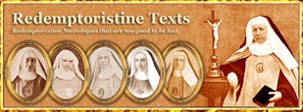
.jpg)









